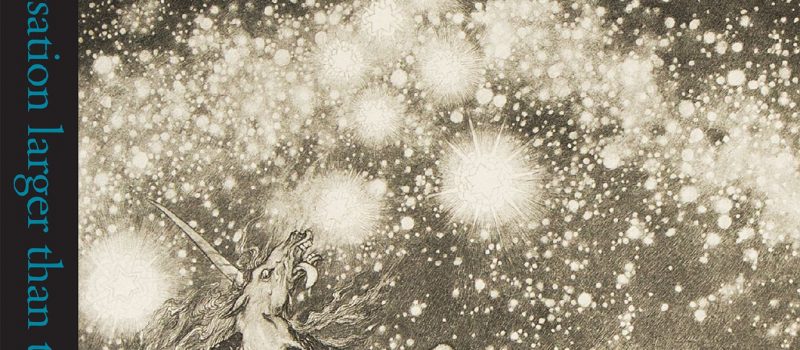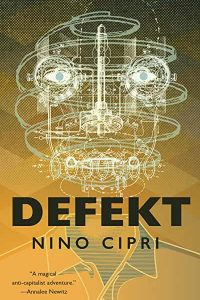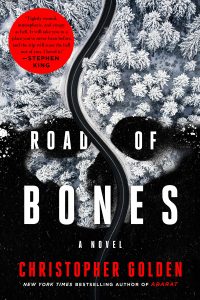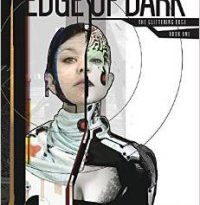Gary K. Wolfe Reviews A Conversation Larger than the Universe by Henry Wessells
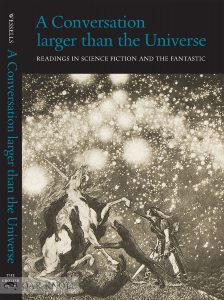 A Conversation Larger than the Universe: Readings in Science Fiction and the Fantastic 1762-2017, Henry Wessells (Oak Knoll Books 978-1-60583-074-2, $35.00, 288pp, tp) January 2018.
A Conversation Larger than the Universe: Readings in Science Fiction and the Fantastic 1762-2017, Henry Wessells (Oak Knoll Books 978-1-60583-074-2, $35.00, 288pp, tp) January 2018.
Sometimes an exhibition catalog can provide a much-needed opportunity to step back and regain some perspective on what makes us like this stuff in the first place, even if we can’t make it to the exhibition itself. A few years ago the British Library mounted an extensive SF exhibition which I never saw, though Mike Ashley’s accompanying book Out of this World: Science Fiction but Not as You Know It, made for fascinating browsing, offering endless nuggets and curiosities even if not particularly adding much new to the various literary histories of SF now available (including Ashley’s own). Much the same can be said of Henry Wessells’s A Conversation Larger than the Universe, a series of essays accompanying an exhibit of some seventy items, drawn mostly from Wessells’s own collection, at the Grolier Club in New York through March 10 of this year. Wessells is an antiquarian bookseller and collector as well as an eclectic and voluminous reader – a “bookman” in the now-almost-archaic sense of the term. His passions range from John Crowley and Robert Sheckley to W.H Hudson and Richard Burton, with nods to pulp classics like Doc Savage, and while the 17 more-or-less chronological essays here sometimes revert to encyclopedia-like entries or old-fashioned literary appreciations, they are peppered with fascinating details and provocative insights. I had no idea, for example, that William Beckford, author of the Gothic novel Vathek, was the richest man in England until a scandal sent him into exile.
On the other hand, I wonder what current historians of Gothic literature would make of Wessells’s claim that the first Gothic novel was not The Castle of Otranto, as standard literary histories would have you think, but rather Longsword, by the Irish author Thomas Leland (Wessells also says it was the first historical novel in English and “the first work of horror literature”). Later on, Wessells pays due respect to Mary Shelley (discussing The Last Man, “the first secular apocalypse,” as well as Frankenstein, but also pays attention to Sara Coleridge’s 1837 Phantasmion, which he says is “the first fantasy novel in English”. Wessells is fond of such “firsts”, which sometimes seem as much collectible markers as literary history arguments; we’re told that W.H. Hudson’s 1885 The Purple Land is “clearly the first work of magic (or magical) realism,” something that some Latin American writers might be willing to discuss, and that William Morris’s The Sundering Flood is “the first modern work of fantasy with a map,” suggesting that what most of us viewed as a post-Tolkien phenomenon is actually far older.
I suspect that such claims, some of which are more persuasive than others, are more a matter of affection and enthusiasm than of trivia-mongering, and it’s that affection and enthusiasm that sets the tone of the whole book. As John Crowley says in his introduction, Wessells is fascinated not only by books as objects, but by their contents as well: he’s widely and deeply read in the field, and his “conversations” with these books feel exactly like that – like having a rambling post-dinner conversation with a master literary raconteur. His discussions of more recent books range from acknowledged classics like Russell Hoban’s Riddley Walker and Peter Straub’s Shadowland to less familiar titles by William H. Wilson, Wendy Walker, and Timothy D’Arch Smith (part of a fascinating side ramble on rock ‘n’ roll in SF), the most recent being Christopher Brown’s Tropic of Kansas. While the many illustrations can’t quite be the same as seeing the actual exhibit, it’s still exciting to see Crowley’s inscription of Little, Big to Tom Disch, or a handwritten letter to Disch from Joanna Russ. On the other hand, those who simply view the exhibit might miss out on Wessells’s clearly written and generously rewarding love letter to his long involvement with fantastika.
Gary K. Wolfe is Emeritus Professor of Humanities at Roosevelt University and a reviewer for Locus magazine since 1991. His reviews have been collected in Soundings (BSFA Award 2006; Hugo nominee), Bearings (Hugo nominee 2011), and Sightings (2011), and his Evaporating Genres: Essays on Fantastic Literature (Wesleyan) received the Locus Award in 2012. Earlier books include The Known and the Unknown: The Iconography of Science Fiction (Eaton Award, 1981), Harlan Ellison: The Edge of Forever (with Ellen Weil, 2002), and David Lindsay (1982). For the Library of America, he edited American Science Fiction: Nine Classic Novels of the 1950s in 2012, with a similar set for the 1960s forthcoming. He has received the Pilgrim Award from the Science Fiction Research Association, the Distinguished Scholarship Award from the International Association for the Fantastic in the Arts, and a Special World Fantasy Award for criticism. His 24-lecture series How Great Science Fiction Works appeared from The Great Courses in 2016. He has received six Hugo nominations, two for his reviews collections and four for The Coode Street Podcast, which he has co-hosted with Jonathan Strahan for more than 300 episodes. He lives in Chicago.
This review and more like it in the January 2018 issue of Locus.


